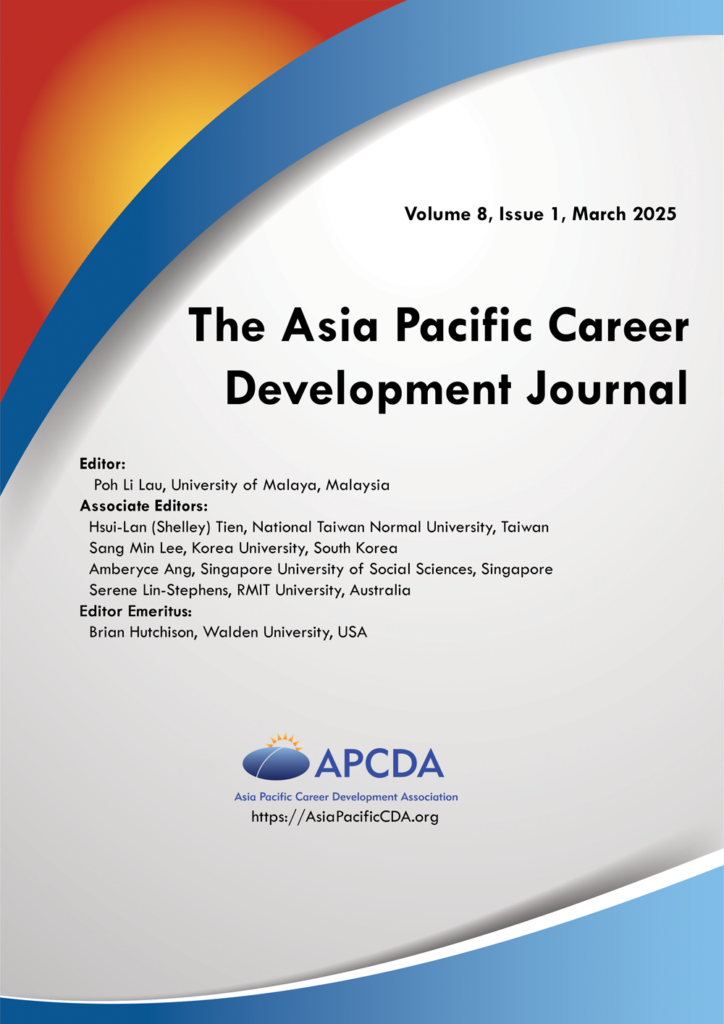The Asia Pacific Career Development Journal, Vol 8, No 1

Vol 8 No 1 (2025):
March 2025 Issue
Published: 2025-03-28
Lead Article
Jeremiah Wong Chung Chiat
Abstract: This qualitative, descriptive study examines the influence of career development practitioner (CDP) skill policies, training, and practices within Singapore’s career development landscape. Focusing on Workforce Singapore’s Career Development Framework (WSG CDF), established in 2018, the study draws comparisons with renowned international frameworks. It examines how CDPs from public, private, and union sectors perceive the relevance and alignment of existing skill policies with their professional roles, practice requirements, and workplace demands. Findings gathered from 15 semi-structured interviews reveal that CDPs train under both legacy and contemporary training programs—including the National Career Development Association’s Facilitating Career Development training program, the Workforce Skills Qualifications’ Advanced Certificate in Career Development Facilitation/Global Career Development Facilitator Singapore, and the more recent WSG Career Facilitation Program. The study investigates how these programs are applied and valued across various career service settings. Our findings indicate notable disparities in skill perceptions, the underutilization of skills, and a misalignment between policy goals and actual career development practices. The participants express concerns about the effectiveness and verification of skill utilization in delivering meaningful outcomes for clients, citing poor alignment with overarching policy objectives. Thematic analysis reveals systemic shortcomings in the ability of workplaces to assess skill utilization and integrate CDP skills effectively, raising critical questions about policy effectiveness, the purpose of credentialing, and the evolving professional identity of CDPs. Overall, this study contributes to the limited literature on career development policy in Singapore, emphasizing the need for cohesive alignment between policy and practice. Recommendations include improving skill utilization, implementing internationally recognized quality assurance practices and systems, and fostering international collaboration to support the development of a sustainable CDP ecosystem.
Review Article 1
Leong Qian Rou and Divyashine Asok Kumar
Abstract: Counselor impairment is a critical ethical issue that compromises professional competence, client well-being, and the overall integrity of the counseling profession. While previous research has extensively examined self-care strategies to prevent impairment, this review broadens the discussion by emphasizing a multi-level approach that integrates individual responsibility, organizational support, and ethical decision-making frameworks. This paper details the various causes and consequences of counselor impairment, highlighting how factors such as burnout, vicarious trauma, and secondary traumatic stress impact counselors’ ability to provide ethical and effective services. Beyond self-care strategies, this review underscores the vital role of systemic interventions, including structured supervision and workload management, in reducing counselor impairment. Ethical guidelines from professional organizations emphasize that preventing impairment requires both individual self-regulation and organizational accountability. By reframing counselor impairment as an issue that extends beyond personal resilience to include ethical and institutional responsibilities, this paper advocates for a sustainable, ethically driven approach to impairment prevention. Future research should further examine the effectiveness of institutional policies and regulatory oversight in fostering counselor resilience and ensuring ethical practice.
The Asia Pacific Career Development Journal (APCDJ) is an international biannual publication dedicated to all career development and intervention related topics. It is the official journal of the Asia Pacific Career Development Association (APCDA: https://AsiaPacificCDA.org The journal welcomes submissions focused on, but not limited to, the following topics: career counseling, individual and organizational career development, work and leisure, career education, career coaching, and career management.
